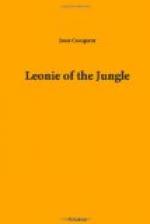Cuxson’s method and brain were rather like his gait; as he had said in Rockham cove, he was slow! He could not and never had, even at Harrow, been able to run a hundred yards without becoming most uncomfortably blown; but he could walk anyone to death at a set plodding steady tramp, accomplishing twenty miles without turning a hair; while after a series of terrific spurts, and enforced periods of rest, his companions would give up dishevelled, sweating, and unpleasantly mortified miles away from the desired goal.
Problems, mathematical or medical, were treated in just the same way. The more brilliant of his fellow-students would seize upon a pen, fill reams of paper and slap the result down triumphantly at the end of an hour, to find themselves later, and again with mortification at the bottom of the list, or not on it at all; whereas Cuxson, after hours of searching here and there in the convolutions of his grey matter, would light on a thread, a grain or a speck of dust which he would proceed to turn inside out, or tear to pieces; the outcome of which process would be printed at length in the Lancet or some such-enlivening journal.
So he lay on the long chair in the corner reserved for sahibs, and was not too uncomfortable, nor in any way uneasy as to the result of his investigations, although all that he had to build his hopes upon was the word of a native, and a piece of orange silk picked out in silver with the dust of a sundri breather adhering, which lay in his pocketbook with a ring of seaweed, and some glistening strands of tawny hair.
The serang, meanwhile, parleyed with certain gatherers of golaputtah which is a special palm leaf growing in the Sunderbunds for the express purpose of thatching boats and suapatti huts; and having discussed the ins and outs, and pros and cons of the situation with every male upon the boat, had transferred the sahib with his guide and coolie to a native boat, after a gratifying give and take in silver rupees which are so much nicer to handle than dirty notes.
And an old priest made sacrifice of a black kid unto his god, having been apprised in the mysterious native way of the approaching arrival of the last person on earth he wished to see.
CHAPTER XXXVI
“What hath night to do with sleep?”—Milton.
“What a nuisance!”
Leonie turned on her bed and frowned through the chick at the two girls who had ensconced themselves in long chairs on the verandah outside her bedroom.
Broad-minded and big-hearted, she had tried to overcome the intense irritation which the Eurasian manner of speech invariably aroused in her. Some get accustomed in time to the parrot-like monotony; some don’t; and to the end of his days the young, immaculately groomed and turned-out assistant in Hamilton’s will wonder why the beautiful girl with gold-flecked eyes had suddenly frowned, and placing the trifle intended for a wedding present upon the glass counter, had left the shop with an appallingly inadequate excuse.




